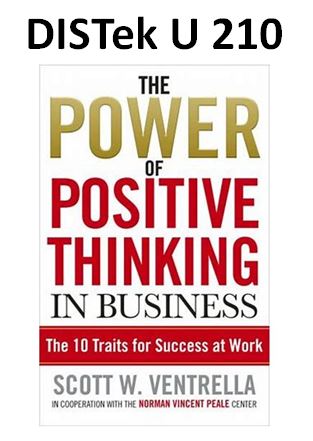In Part 1 of this two part series, we heard from DISTek Software Engineers Gerardo Zamora and Chad Stapes, who recently completed DISTek U 210 – a DISTek training course offered internally to engineers wanting to embark on a path of growth and prepare themselves for the next engineering tier level. Gerardo reviewed the book, Eat that Frog!, and Chad reviewed the book, You Don’t Need a Title to be a Leader.
In this Part 2, Michael Barnhardt, a Software Engineer at DISTek for over 5 years, discusses, The Power of Positive Thinking in Business, and provides an overview of the final component of the DISTek U 210 course, the mentor-ship program.
Michael Barnhardt:
The Power of Positive Thinking in Business
The last book we read for the DISTek U 210 course was, The Power of Positive Thinking in Business. For this book, the topics included increasing motivation, SMART goals, visualization, and tips to think more positively. This book presented a lot of topics and information. For the purpose of this review, I am going to focus on my biggest takeaway in relation to a more positive way of thinking. This was referred to as the Act, Think, Feel, Believe (ATFB) method. In essence, this was explained that in order to feel positively, or believe in what you are doing, simply acting and thinking in a manner to compliment these behaviors will get you there. This comes from training your brain to think a certain way based on your actions. Building yourself up by continually telling yourself positive affirmations about yourself, eventually you will believe it. This can help boost confidence and create a positive attitude toward situations. On the reverse side, this can also be used to bring yourself down. If you continually use negative affirmations about yourself, you may be training yourself to have little belief in yourself. Keeping that in mind, it is important to be mindful of the words you use.
With this in mind, I have begun working on becoming cognizant of the words I am using as I think about tasks, and stop myself when I begin to think about a situation in a negative context. This means I avoid using words like “I hate this”, “This is nice, but…”, and “I have to do this”. When these types of phrases come to mind, I tend to stop and rephrase them with a more positive or proactive connotation. “There are things I dislike about this and here’s how it could be made better.” Replacing the word “but” with the word “and,” as well as “I get to work on this task.” Usually just a one- or two-word change is all it takes to view a situation more positively, and while it takes some time to get the hang of, it has worked for me in feeling more motivated and allowing me to enjoy tasks more than I previously did.
Mentor-ship Program
The last part of the DISTek U 210 course was the mentor-ship program. This allowed us a chance to utilize a number of lessons and behaviors learned throughout the course, and apply them towards teaching a coworker about a new skill. The project was left open to interpretation and it was up to the students to decide what we wanted to do and set the acceptance criteria. This open-endedness meant discussions were more organic, and therefore more mentorship-like, rather than us “lecturing” the mentees.
Perhaps the greatest benefit of the mentor-ship, and DISTek U 210 in general, was that it provided a great opportunity to make connections with a variety of coworkers, as well as get a taste for project management in a low risk setting. This setup allowed for real world application of lessons learned in the class, such as communication, setting goals with realistic expectations, finding and utilizing resources, and demonstrating flexibility and resiliency to changes that came up throughout the project.
This mentor-ship allowed individuals to approach tasks with a creativity we may not always get to demonstrate when working with a customer, as well as hold themselves accountable for any successes/failures to use them as great learning experiences. This flexibility ties back to the power of persuasive communication from the second book (You Don’t Need a Title to be a Leader), because not only were mentors accountable for their share of success or failure, but they also needed to use communication as a tool, so adjusting to the mentee’s learning style was key for the project to be effective.
Summary
DISTek U is a good course for anyone looking to set themselves up for success, regardless of your current engineering level. Additionally, it is definitely geared towards those willing to put in the extra effort, not only to do the homework and bring discussion to the table, but also to apply these new ideas in their daily lives. Those who exhibit the “stretch” value will find enjoyment in this and other DISTek U tracks for a similar reason: We find joy in improving ourselves to live out our potentials.


